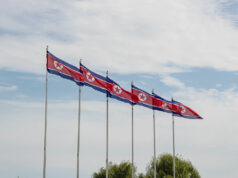Three months in, deaths mount and diplomats vie to stop Gaza war’s spread

JERUSALEM/AMMAN — Top international diplomats discussed strategies for keeping the Gaza war from spreading beyond Israel and the Palestinian territories on Sunday, exactly three months after the start of the conflict, as Palestinian and Israel authorities claimed thousands of military and civilian deaths.
US Secretary of State Antony Blinken and the European Union’s top diplomat, Josep Borrell, were on separate trips to the region to try to quell spillover from the three-month-old war into Lebanon, the Israeli-occupied West Bank and Red Sea shipping lanes.
Israel and Hezbollah often trade fire across the Lebanese border, the West Bank is seething with anger, and the Iran-aligned Houthis in Yemen seem determined to continue attacks on Red Sea shipping until Israel stops bombarding Palestinians in Gaza.
Mr. Blinken was in Amman, Jordan, after stops in Turkey and Greece. Mr. Borrell was on a Jan. 5-7 trip to Lebanon. Both told reporters their priority was quelling spillover from the fighting. “We have an intense focus on preventing this conflict from spreading,”
Mr. Blinken told reporters before heading to Jordan from Chania, Greece, on his fourth trip to the region since Oct. 7, when Hamas launched a cross-border attack on Israel.
Israeli military spokesperson Rear Admiral Daniel Hagari gave a roundup on Saturday, the eve of the three-month anniversary, as Israel has signaled a shift recently to scale down forces while facing international pressure over the mounting civilian death toll and humanitarian crisis in the Gaza strip.
Mr. Hagari said Israeli forces had completed dismantling the Hamas militant group’s “military framework” in northern Gaza and killed around 8,000 militants in that area. “We are now focused on dismantling Hamas in the center of and south of the (Gaza) strip,” he said in an online briefing.
“Fighting will continue during 2024. We are operating according to a plan to achieve the war’s goals, to dismantle Hamas in the north and south,” Mr. Hagari said.
Israel’s bombing and incursions of Gaza began after Hamas militants from the strip attacked Israel on Oct. 7, killing 1,200 people and taking 240 hostage, according to Israeli officials.
More than 100 hostages are still believed to be held by Hamas.
Israel’s offensive, aimed at wiping out Hamas, had killed 22,722 Palestinians by Saturday, according to Palestinian health officials, and devastated the tiny Gaza enclave.
Palestinian health ministry casualty figures do not differentiate between fighters and civilians, but the ministry has said that 70% of Gaza’s dead are women and people under 18. The fighting has displaced most of Gaza’s 2.3 million population, with many homes and civilian infrastructure left in ruins amid acute shortages of food, water and medicine.
‘THEY STILL BOMBED US’
On Saturday, fighting raged on in Gaza, especially in and near the southern city of Khan Younis, where the Israeli military said it had killed members of Hamas, which rules the densely populated coastal strip.
The Palestinian Red Crescent reported heavy shelling near the Al-Amal Hospital in Khan Younis. Shrapnel flew into the medical facility amid the sound of firing from drones, it said on social media.
The official Palestinian news agency WAFA said an Israeli air strike on a residential building on Saturday night had killed at least 12 people and wounded 50, and another strike on a school in central Gaza had killed as many as four.
The Israeli military said its commandos had killed several militants and found military equipment used by Hamas.
Standing outside a morgue in Khan Younis, 11-year-old Mahmoud Awad said Israeli airstrikes had killed his parents and siblings. “We were in al-Shati refugee camp and they dropped fliers saying Gaza is a battlefield, so we fled to Khan Younis because it was a safe place, and they still bombed us,” he said.
Israel denies targeting civilians and says Hamas fighters embed themselves among civilian populations, working from tunnels beneath facilities like hospitals. Hamas, which is backed by Iran and is sworn to Israel’s destruction, denies using civilians as human shields.
Mr. Blinken met the leaders of Turkey and Greece on Saturday at the start of a week-long trip that will also take him to Israel, the Israeli-occupied West Bank, Jordan, Qatar, the United Arab Emirates, Saudi Arabia and Egypt.
In Istanbul, Blinken held talks with Turkish Foreign Minister Hakan Fidan and President Tayyip Erdogan, a fierce critic of Israel’s military actions in Gaza. Turkey, which unlike most of its NATO allies does not class Hamas as a terrorist organization, has offered to mediate.
Mr. Blinken said he would spend the next few days discussing with allies and partners how they can use their influence to protect civilians and maximize humanitarian aid.
Mr. Borrell expressed alarm in Beirut about exchanges of fire between Israel and Hezbollah forces in Lebanon and the risk that Lebanon could be dragged into the Gaza conflict.
“Diplomatic channels have to stay open. War is not the only option – it’s the worst option,” Borrell said. — Reuters



